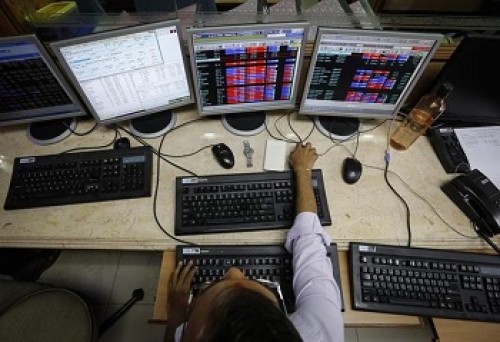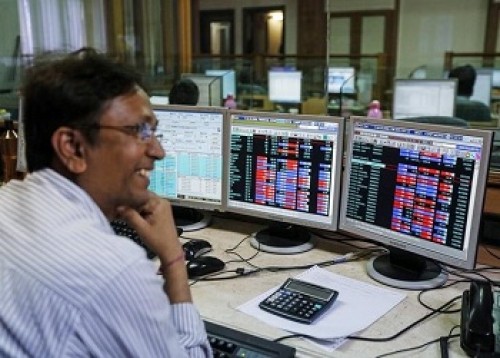Opening Bell : Markets likely to get optimistic start tracking strong gains in global peers

Follow us Now on Telegram ! Get daily 10 - 12 important updates on Business, Finance and Investment. Join our Telegram Channel
Indian markets oscillated between gains and losses and ended in red on Monday as investors chose to stay on the sideline amid geopolitical tensions in Israel. Today, markets are likely to get optimistic start tracking strong gains in global peers. Investors will continue to keep eye on earnings for more directional cues. Sentiments will get a boost as a survey by industry body Ficci stated that India’s economic growth is expected at 6.3 per cent during 2023-24 on the back of good health of the financial sector and uptick in private investment even as downside risks remain. However, foreign fund outflows likely to dent sentiments. Provisional data from the National Stock Exchange (NSE) showed that foreign institutional investors (FII) sold shares worth Rs 593.66 crore on October 16. Some cautiousness may come with a private report that a sharp decline in tomato prices may have caused the headline CPI (Consumer Price Index) inflation to plunge to 5.02% in September from 6.83% in August, but risks to food prices still persist. As per the report, an erratic monsoon and low reservoir levels are likely to have moderately adverse impact on yields of several crops, including paddy, pulses, oilseeds, and spices, which may keep inflationary pressures elevated in the near-term. Auto stocks will be in focus as industry body SIAM said passenger vehicle wholesales in India rose to its highest level in any quarter so far in the July-September period riding on the back of robust demand for utility vehicles. There will be some reaction in aluminium industry stocks amid reports that aluminium producers' association AAI has sought government's intervention for notification of rates for aluminium special economic zones and export oriented units (EOUs) under the RoDTEP scheme. Sugar industry stocks will be in limelight with a private report that the Centre may consider imposing stock limits on sugar trade if all entities engaged in the business don’t disclose their inventories on the official portal by October 17. Additionally, the government is likely to extend the current restrictions on sugar exports indefinitely after October 31.
The US markets ended higher on Monday as investors were optimistic about the start of earnings season, while transportation and small-cap shares also jumped. Asian markets are trading mostly in green on Tuesday following overnight gains on Wall Street.
Back home, Indian equity benchmarks ended marginally in red on Monday amid weak trends in global markets and spike in Brent crude oil prices due to geopolitical tension in the Middle East. Markets made a negative start and soon tuned volatile as traders got anxious with data showing that India's merchandise exports saw a fall of 2.6 percent year on year, contracting to $34.47 billion in September. The fall was also significantly reflected in imports, which contracted by 15 percent to $53.84 billion in September 2023 against September 2022. However, markets managed to keep their heads above water in afternoon deals, as traders took some support with the International Monetary Fund’s (IMF) statement that the overall macroeconomic environment in India is ‘pretty sound’, it is fiscally disciplined and the central bank moved fast to bring inflation under control. Some support also came with the provisional data available on the NSE showing that foreign institutional investors (FII) purchased shares worth net Rs 317.01 crore on October 13, 2023. But, key indices failed to hold recovery and ended with minor losses as some pessimism remained among traders with chief economic advisor (CEA) V Anantha Nageswaran’s statement that private investment is happening in India, and inflation is not a concern, but crude oil prices and tightening global monetary conditions pose a risk. Some concern also came with reports stating that days after the Reserve Bank took an unprecedented step of warning banks of their ballooning retail book, a foreign brokerage has cautioned against increasing default risks in retail unsecured loans of banks. Meanwhile, traders took note of report that India’s inflation based on wholesale price index (WPI) remained in the deflationary zone for the sixth straight month at (-) 0.26% for the month of September 2023 as against (-) 0.52% recorded in August 2023. Deflation in the reported month is primarily due to fall in prices of coal, minerals, textiles, basic metals and food products as compared to the corresponding month of previous year. Finally, the BSE Sensex fell 115.81 points or 0.17% to 66,166.93 and the CNX Nifty was down by 19.30 points or 0.10% to 19,731.75.
Above views are of the author and not of the website kindly read disclaimer






















